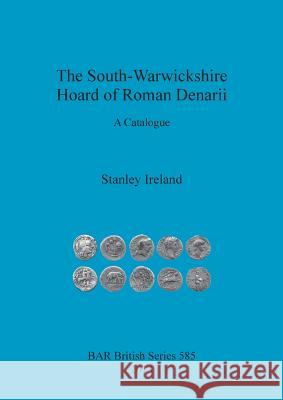The South-Warwickshire Hoard of Roman Denarii: A Catalogue » książka
The South-Warwickshire Hoard of Roman Denarii: A Catalogue
ISBN-13: 9781407311593 / Angielski / Miękka / 2013 / 82 str.
One Sunday evening in the summer of 2008, while prospecting on commercial land in the vicinity of the village of Warmington, situated on the summit of Edge Hill (south Warwickshire, England), a metal-detectorist saw a small silver disk on the surface. This was followed by the registration of a further two coins by his equipment, then others as he began a methodical survey of the area. After he had alerted the local Warmington Heritage Group to his discovery, the decision was taken to locate and mark the nucleus of the soundings being made and to leave further work to the following day. This revealed a spread of coins, at times up to fifty metres away from the original finds, but it was not till Tuesday that the nucleus itself was excavated, revealing a pot full of unstratified coins. Following cleaning, photographing, and initial identification, the hoard was deposited in the Warwickshire Museum pending arrangement of the necessary inquest in accordance with the Treasure Act. During this period additional coins came to light, bringing the total to 1146 specimens. Chronologically the hoard covers the period from 194/190 BC to AD 64, and from analogies elsewhere clearly represents a cross-section of material in circulation at the time of deposition in view of the fact that, with the exception of some issues at times of military stress, denarii had largely remained stable in terms of both fineness and weight from their inception to the reform instituted by Nero. This volume presents a detailed and essential catalogue of this splendid hoard.
One Sunday evening in the summer of 2008, while prospecting on commercial land in the vicinity of the village of Warmington, situated on the summit of Edge Hill (south Warwickshire, England), a metal-detectorist saw a small silver disk on the surface. This was followed by the registration of a further two coins by his equipment, then others as he began a methodical survey of the area. After he had alerted the local Warmington Heritage Group to his discovery, the decision was taken to locate and mark the nucleus of the soundings being made and to leave further work to the following day. This revealed a spread of coins, at times up to fifty metres away from the original finds, but it was not till Tuesday that the nucleus itself was excavated, revealing a pot full of unstratified coins. Following cleaning, photographing, and initial identification, the hoard was deposited in the Warwickshire Museum pending arrangement of the necessary inquest in accordance with the Treasure Act. During this period additional coins came to light, bringing the total to 1146 specimens. Chronologically the hoard covers the period from 194/190 BC to AD 64, and from analogies elsewhere clearly represents a cross-section of material in circulation at the time of deposition in view of the fact that, with the exception of some issues at times of military stress, denarii had largely remained stable in terms of both fineness and weight from their inception to the reform instituted by Nero. This volume presents a detailed and essential catalogue of this splendid hoard.











